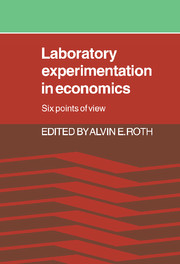Book contents
- Frontmatter
- Contents
- Acknowledgments
- List of contributors
- 1 Introduction and overview
- 2 Bargaining phenomena and bargaining theory
- 3 Equity and coalition bargaining in experimental three-person games
- 4 The psychology of choice and the assumptions of economics
- 5 Hypothetical valuations and preference reversals in the context of asset trading
- 6 Economics according to the rats (and pigeons too): what have we learned and what can we hope to learn?
- 7 Dimensions of parallelism: some policy applications of experimental methods
2 - Bargaining phenomena and bargaining theory
Published online by Cambridge University Press: 24 October 2009
- Frontmatter
- Contents
- Acknowledgments
- List of contributors
- 1 Introduction and overview
- 2 Bargaining phenomena and bargaining theory
- 3 Equity and coalition bargaining in experimental three-person games
- 4 The psychology of choice and the assumptions of economics
- 5 Hypothetical valuations and preference reversals in the context of asset trading
- 6 Economics according to the rats (and pigeons too): what have we learned and what can we hope to learn?
- 7 Dimensions of parallelism: some policy applications of experimental methods
Summary
Introduction
I first began to plan an experimental study of bargaining while I was preparing a monograph (Roth, 1979) concerned with what was then (and is probably still) the most comprehensively articulated body of formal theory about bargaining in the economics literature. I am referring to the game-theoretic work that followed in the tradition begun by John Nash (1950).
A number of experiments had already investigated bargaining situations of the kind addressed by this set of theories, and some were even explicitly concerned with testing the predictions of the theory that Nash had proposed. However, none of these experiments corresponded closely to the conditions assumed by Nash's theory or measured those attributes of the bargainers that the theory predicted would influence the outcome of bargaining. This was largely because, taken literally, Nash's theory applies to bargaining under conditions unlikely to obtain in natural bargaining situations and depends on attributes of the bargainers that are difficult to measure. Specifically, Nash's theory assumes that bargainers have available to them the information contained in one another's expected utility functions (i.e., each bargainer's preferences and risk posture), and it depends on this information to generate a prediction about the outcome of bargaining. Some of the earlier experimenters had elected to examine bargaining under conditions they believed more closely approximated natural situations, and all had assumed, for the purpose of obtaining predictions from Nash's theory, that the preferences of all bargainers were identical and risk neutral.
- Type
- Chapter
- Information
- Laboratory Experimentation in EconomicsSix Points of View, pp. 14 - 41Publisher: Cambridge University PressPrint publication year: 1987
- 18
- Cited by



